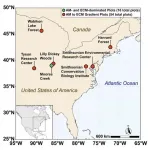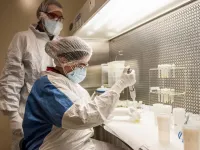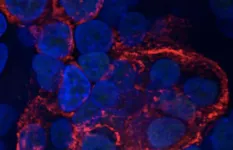Robotic exoskeleton training expands options for stroke rehabilitation
Researchers find high-dose gait training with robotic exoskeleton during acute inpatient rehabilitation may aid early recovery
2021-01-29
(Press-News.org) East Hanover, NJ. January 29, 2021. A team of New Jersey researchers has demonstrated that high-dose therapy gait training using robotic exoskeletons may aid early rehabilitation for acute stroke. The article, "Robotic exoskeleton gait training during acute stroke inpatient rehabilitation" (doi: 10.339/fnbot.2020.581815), was published October 30, 2020 in Frontiers in Neurorobotics is available open access at: https://www.frontiersin.org/articles/10.3389/fnbot.2020.581815/full
The authors are Karen Nolan, PhD, Kiran Karunakaran, PhD, and Kathleen Chervin, of Kessler Foundation, Michael Monfett, MD, of Children's Specialized Hospital, Radhika Bapineedu, MD, and Neil N. Jasey Jr, MD, of Kessler Institute for Rehabilitation, and Mooyeon Oh-Park, MD, of Burke Rehabilitation Hospital, formerly with Kessler. Drs. Nolan and Karunakaran are also affiliated with Children's Specialized Hospital. Kessler scientists and clinicians have faculty appointments at Rutgers New Jersey Medical School.
The need for stroke rehabilitation is tremendous, given the large numbers of stroke survivors with deficits in mobility, balance and coordination that limit their activities of daily living. Advances in robotics and biomedical engineering are expanding the options for rehabilitative care. Researchers are applying new technologies to gait training that may offer advantages over traditional labor intensive physical therapy. This inpatient study of a robotic exoskeleton (Ekso GT, Ekso Bionics, Inc,) demonstrated the potential to improve gait training after acute stroke toward the goal of earlier recovery of motor function.
Participants included 44 individuals (ages 18 to 82 years) admitted to Kessler Institute for Rehabilitation for acute stroke. Half received conventional standard of care (SOC), and half received SOC with an option for overground gait training in the Ekso GT (RE+SOC). Both groups received the same amount of overall therapy time. Overground gait training in the exoskeleton was supervised by a licensed physical therapist who adjusted the variable bilateral assistance of the Ekso GT according to each individual's progress. Outcome measures were total distance walked during inpatient rehabilitation and functional independence measure (FIM) score. The RE-SOC group trained in the Ekso GT at least three times during their stay.
"We found that gait training in the exoskeleton allowed us to increase the dose of gait training without increasing the duration of inpatient rehabilitation," said Dr. Nolan, assistant director of the Center for Mobility and Rehabilitation Engineering Research at Kessler Foundation. "Because overground walking in the exoskeleton requires active effort on the part of the participant," she added, "early intervention with this type of gait training promotes brain plasticity that may lead to greater functional improvements and more lasting effects when combined with conventional training."
INFORMATION:
Funding sources: Kessler Foundation
Learn about the Foundation's ongoing studies in stroke rehabilitation research: https://kesslerfoundation.org/research/studies/stroke
Contact our recruitment specialist at: ResearchStudies@KesslerFoundation.org
About Kessler Foundation
Kessler Foundation, a major nonprofit organization in the field of disability, is a global leader in rehabilitation research that seeks to improve cognition, mobility and long-term outcomes, including employment, for people with neurological disabilities caused by diseases and injuries of the brain and spinal cord. Kessler Foundation leads the nation in funding innovative programs that expand opportunities for employment for people with disabilities. For more information, visit KesslerFoundation.org.
For more information, or to interview an expert, contact: Carolann Murphy, 973.324.8382, CMurphy@KesslerFoundation.org
[Attachments] See images for this press release:

ELSE PRESS RELEASES FROM THIS DATE:
2021-01-29
Coronary artery calcification -- the buildup of calcified plaque in the walls of the heart's arteries -- is an important predictor of adverse cardiovascular events like heart attacks. Coronary calcium can be detected by computed tomography (CT) scans, but quantifying the amount of plaque requires radiological expertise, time and specialized equipment. In practice, even though chest CT scans are fairly common, calcium score CTs are not. Investigators from Brigham and Women's Hospital's Artificial Intelligence in Medicine (AIM) Program and the Massachusetts General Hospital's Cardiovascular Imaging Research Center (CIRC) teamed up to develop and evaluate a deep learning system ...
2021-01-29
In the treatment of SARS-CoV-2, the virus that causes COVID-19, antiviral drug remdesivir has emerged as a promising candidate.
Remdesivir works by disrupting the virus's ability to replicate, but its exact mechanism has remained a mystery. Using advanced computational simulations, researchers at the Pritzker School of Molecular Engineering (PME) at the University of Chicago have revealed just how the drug works at the molecular level. They also found that two drugs that work in a similar manner, ribavirin and favilavir, do not bind as effectively to the virus.
"It's important to understand ...
2021-01-29
Researchers at the University of Maryland, Baltimore County (UMBC) have made strides in automated legal document analytics (ALDA) by creating a way to machine-process the Code of Federal Regulations (CFR). The CFR is a complex document containing policies related to doing business with the federal government. All business affiliates of the federal government must comply with the CFR. For government contracts to be equitably open to a broad range of businesses, policies within the CFR must be accessible.
This document automation is just one part of a broader project to help contractors and other entities manage and monitor ...
2021-01-29
COLUMBUS, Ohio - Nearly nine out of 10 Americans say they enjoy sports at least a little, but heterosexual men more commonly identify as passionate sports fans, a new study suggests.
A survey of nearly 4,000 American adults found that only 11% said they did not identify as sports fans at all. Over 40% were passionate fans, identifying themselves as being "quite a bit" or "very much so" sports fans.
About 60% of heterosexual men in the survey identified as passionate sports fans, compared to about 40% of both heterosexual women and lesbians. About 30% of gay men reported being passionate sports fans.
"We found that U.S. adults respond overwhelmingly that they are sports fans," said Chris Knoester, co-author of the ...
2021-01-29
Trees are often heralded as the heroes of environmental mitigation. They remove carbon dioxide from the atmosphere, which slows the pace of climate change, and sequester nutrients such as nitrogen, which improves water and air quality.
Not all tree species, however, perform these services similarly, and some of the strongest impacts that trees have on ecosystems occur below the surface, away from the eyes of observers. This complicates efforts to predict what will happen as tree species shift owing to pests, pathogens, and climate change as well as to predict which species are most beneficial in reforestation ...
2021-01-29
Parents know the scenario all too well: their child misbehaves and it comes time for discipline.
Research conducted globally shows that spanking is not the best option. But verbal reasoning, which explains why the behavior is wrong, may not always have the intended positive effect if the parent is loud and abrupt, according to a new University of Michigan study.
The findings indicate both positive and negative outcomes that could have lasting consequences on children's emotional development. Verbal reasoning was associated with higher levels of getting along with others, but also with increased aggression and higher levels of distraction.
"Positive discipline doesn't always seem to have all that many positive benefits," ...
2021-01-29
Another wave of COVID-19 is putting millions out of work, while tens of millions more remain unemployed, and Congress debates aid.
Now, a new Boston University School of Public Health (BUSPH) study shows that unemployment help directly translates to people being able to put food on the table.
The CARES Act--passed in March of 2020-- expanded unemployment insurance coverage, amount, and duration.
Published in JAMA Network Open, the study finds that receiving unemployment insurance cuts a person's risk of food insecurity by a third, and halves the likelihood of needing to eat less because of financial constraints. And receiving more coverage, such as the weekly $600 supplement included in CARES until last July, means an even bigger reduction in the risk of going hungry.
"There ...
2021-01-29
RICHLAND, Wash.?Unless radon gas is discovered in a home inspection, most people remain blissfully unaware that rocks like granite, metal ores, and some soils contain naturally occurring sources of radiation. In most cases, low levels of radiation are not a health concern. But some scientists and engineers are concerned about even trace levels of radiation, which can wreak havoc on sensitive equipment. The semiconductor industry, for instance, spends billions each year to source and "scrub" ultra-trace levels of radioactive materials from microchips, transistors and sensitive sensors.
Now chemists at the U.S. Department of Energy's Pacific Northwest National Laboratory have developed ...
2021-01-29
What if scientists knew exactly what impact the SARS-CoV-2 virus had inside our lung cells, within the first few hours of being infected? Could they use that information to find drugs that would disrupt the virus' replication process before it ever gets fully underway? The discovery that several existing FDA-approved drugs--including some originally designed to fight cancer--can stop coronavirus in its tracks indicates the answer is a resounding yes.
A team of Boston University researchers--hailing from BU's National Emerging Infectious Diseases Laboratories ...
2021-01-29
Philadelphia, January 29, 2021--Researchers at Children's Hospital of Philadelphia (CHOP) have developed a gene therapy vector for blood disorders like sickle cell disease and beta-thalassemia that is potentially safer and more effective than those currently used in gene therapy trials for those conditions. The vector, an engineered vehicle for delivering functional copies of the hemoglobin gene to correct a genetic abnormality, leads to the production of more hemoglobin with a lower dose, minimizing the risk of toxic side effects.
The findings were published today in Molecular Therapy.
"These results have many potential benefits for the successful treatment of patients ...
LAST 30 PRESS RELEASES:
[Press-News.org] Robotic exoskeleton training expands options for stroke rehabilitation
Researchers find high-dose gait training with robotic exoskeleton during acute inpatient rehabilitation may aid early recovery



